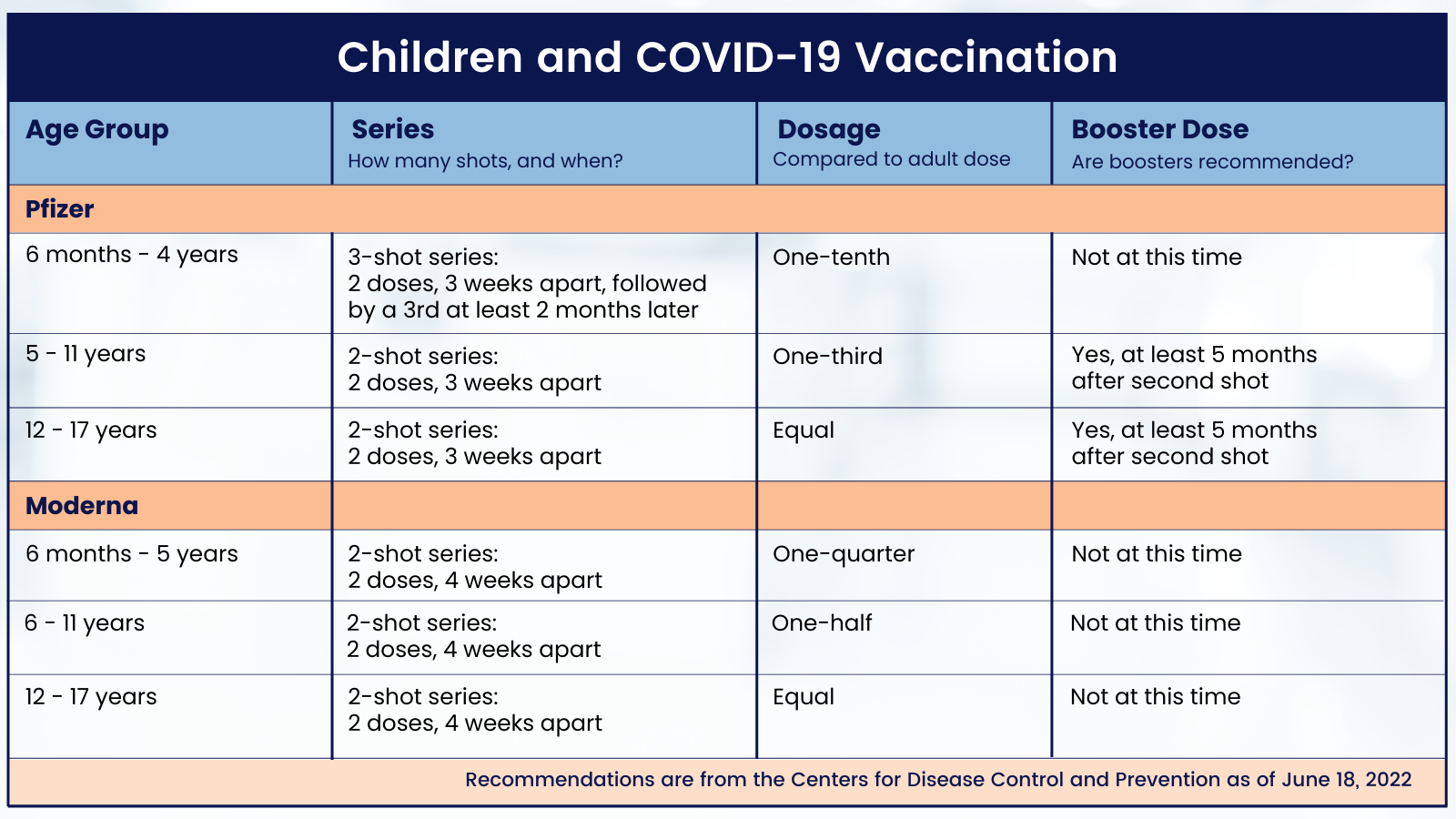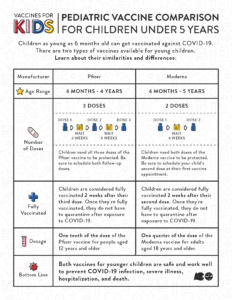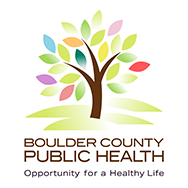COVID-19 Children & Youth

- The FDA has authorized COVID-19 vaccines for children as young as 6 months old. Vaccines for children under 5 years of age will be available in Colorado starting Wednesday, June 22.
- Many vaccine providers are now taking appointments for this age group in advance. Find a list of vaccine providers for young children, or use the map on the CDPHE vaccine finder page to find a provider near you.
- Beginning June 22, all mobile vaccine clinics will have vaccines for younger children. Find an appointment at a CDPHE mobile clinic.
Vaccine Hesitancy in Boulder County
In the first half of 2022, Boulder County Public Health commissioned a study of vaccine hesitancy in Boulder County among parents of children 0–11 years of age. Consultants from Godot Communications ran a series of independent Spanish and English focus groups exploring the web of influence, emotion, information and misinformation behind the community’s decision making.
COVID-19 Vaccine Information for Parents
Getting yourself and your children 6 months and older vaccinated against COVID-19 helps protect you and your family. It also helps keep schools safe and open.
- COVID-19 vaccine providers near you
- Frequently asked questions about vaccinations for kids and teens
The Centers for Disease Control and Prevention (CDC) recommends that everyone six months and older get a COVID-19 vaccination to help protect children from getting seriously sick with COVID-19 and to prevent spreading the virus to those who are not eligible for vaccination.
About the Vaccine
- COVID-19 vaccines have been used under the most intensive safety monitoring in U.S. history. The vaccine has been proven to be safe and effective at preventing the most severe outcomes from COVID infection. There are no long term side effects from the vaccine.
- The COVID-19 vaccine does not alter your DNA.
- Your child’s vaccine record is confidential.
Preparing for Your Child’s Vaccination Visit
- Youth under 18 need parental consent to get vaccinated. Requirements vary by provider. Talk to your provider to see if you should be present at your child’s vaccination appointment or if you can fill out a form to provide parental consent.
- Tell the doctor or nurse about any allergies your child may have.
- After your child’s COVID-19 vaccination, you will be asked to stay for 15–30 minutes so your child can be observed in case they have a severe allergic reaction and need immediate treatment.
- You should receive a paper or electronic version of a fact sheet the tells you more about the vaccine that was administered.
- You should get a vaccination card that tells you what COVID-19 vaccine you received, the date you received it, and where you received it. Keep your vaccination card in case you need it for future use.
- Consider taking a picture of your vaccination card as a backup copy. Do not laminate your vaccine card so it can be updated for future booster shots, if necessary.
- If you do not receive a COVID-19 vaccination card at your appointment, contact the vaccination provider site where you got vaccinated or your state health department to find out how you can get a card.
What You Need to Know
Clinical trials and real-world data show that it is safe for children as young as 6 months old to receive a COVID-19 vaccine.
COVID-19 vaccines for children work the same way as vaccines for adults. But the dose is smaller to make sure it’s safe and gives the best possible protection for each age group.
Thousands of families volunteered to make sure the vaccines for kids are safe and work well. Thanks to their help, more families can make the choice to get protected now, too.
Why get your child vaccinated
- It’s likely your child will be exposed to COVID-19 at some point if they haven’t been already. COVID-19 vaccines help prevent kids from getting severely sick and from long-term complications or even death.
While it’s true that young kids tend to have milder or even asymptomatic cases, COVID-19 infections in young children are not nothing; it’s far more dangerous than the flu. During the omicron wave this past winter, children under 5 were hospitalized at five times the rate of previous pandemic peaks. The vaccine works well to prevent severe illness, hospitalization, and death among children. A CDC report from March 2022 showed that getting vaccinated with two doses was 73% to 94% effective at preventing COVID-related hospitalization among children aged 5 to 17.
With high amounts of virus circulating right now, getting kids vaccinated as soon as possible can bring some peace of mind.
We’re also learning new things all the time about COVID, and that will continue. Measles, for example, can cause major, even fatal complications to people 20 years after they’ve had it. Time will tell whether having COVID may have similar long-term implications for children, so we want to minimize the risk of infections as much as possible.
2. Getting kids vaccinated helps protect everyone.
Although there is evidence that vaccinated people can infect others, they are infectious for a shorter period of time than unvaccinated individuals.
Young kids may be exposed to COVID in daycare or by caretakers and then accidentally expose their grandparents or other high-risk individuals in their lives, especially when there are high levels of transmission of COVID still happening in the U.S.
The bottom line is that even kids under 5 are part of the COVID “chain of transmission.” The more people who are vaccinated, the less transmission will be happening in any community, fewer people will get sick, and there are fewer opportunities for the virus to mutate.
3. COVID vaccines are safe.
No vaccine in existence has had any side effects more than two months from the point of vaccination.
4. Side effects will likely be milder for kids than for adults.
Kids under 5 are given one-tenth the dosage level for adults in each shot which can minimize side effects while still providing protection. Pfizer said that the three-dose regimen is well-tolerated among kids, and the majority of side effects were mild to moderate.
5.Parents of young kids can finally have some peace of mind.
Once everyone is fully vaccinated, less illness overall will mean fewer disruptions and fears.
What should I expect when I bring my child to their appointment?
- Expect to spend at least 30 minutes at the vaccine clinic site.
- It is not recommended to give pain relievers before vaccination to prevent side effects.
- Be ready to support your child during the vaccine visit. Pack their favorite toy, book or blanket to comfort them during vaccinations.
- Tell the doctor or nurse about any allergies your child may have.
- After your child’s vaccination, you will be asked to stay for 15–30 minutes so your child can be observed in case of severe allergic reaction and immediate treatment.
- Wear a mask that covers your nose and mouth.
- You should receive an electronic version of a fact sheet about the specific COVID-19 vaccine received. Each approved and authorized COVID-19 vaccine has its own fact sheet that contains information to help understand the risks and benefits of receiving that specific vaccine.
Learn more about different COVID-19 vaccines.
What’s the difference between the shots?
Pfizer’s and Moderna’s pediatric vaccines differ in several ways.
Pfizer’s is a three-dose series, with the first two shots given three weeks apart and the third shot at least two months after the second. Each dose is one-tenth of the adult version. Moderna’s vaccine consists of two doses given four weeks apart. Each dose is one-quarter of the adult dose.
Common Side Effects
Both vaccines produced mild side effects in young children, which are normal signs that their body is building protection. Many trial participants experienced irritability, sleepiness and pain at the injection site. These side effects may affect their ability to do daily activities, but they should go away in a few days. Some people have no side effects.
In Moderna’s trial, 21% to 26% of kids age 6 months to 5 years developed a fever after each dose — a higher rate than reported among adolescents and adults.
Fever was less common in the Pfizer trial: Around 7% of children 6 to 23 months reported fever after each dose.
Nearly 45% of children age 2 to 4 years old in Pfizer’s trial experienced fatigue, compared with 62% of kids age 3 to 5 years old in the Moderna trial.
Monitor your child’s symptoms
Ask your child’s healthcare provider about getting started with v-safe, a free, smartphone-based tool that uses text messaging and web surveys to provide personalized health check-ins after your child receives a COVID-19 vaccination. Through v-safe, you can report any side effects your child may have after vaccination. V-safe also reminds you to get your child’s second dose. Learn more about v-safe.
What are the risks of infection for unvaccinated youth?
Compared to vaccinated people, unvaccinated children are at a higher risk of becoming infected with COVID-19, getting sick from COVID-19, and spreading the virus to others. Most children with COVID-19 have mild symptoms or have no symptoms at all. However, some children can get severely ill from COVID-19.
The multisystem inflammatory syndrome in children (MIS-C) is a rare but serious condition that has been observed in kids with COVID-19. With MIS-C, different body parts can become inflamed, including the heart, lungs, kidneys, brain, skin, eyes or gastrointestinal organs. The CDC does not yet know what causes MIS-C. However, CDC knows that many children with MIS-C had COVID-19 or had been around someone with COVID-19. MIS-C can be serious, even deadly, but most children who were diagnosed with this condition have gotten better with medical care.
Having certain underlying conditions might increase the risk for severe illness in children. As more information becomes available, CDC will continue to update and share information about the risk for severe illness among children.
Regardless of age, kids with the following underlying medical conditions might also be at increased risk of severe illness compared to other children:
- Asthma or chronic lung disease
- Diabetes
- Genetic, neurologic or metabolic conditions
- Sickle cell disease
- Heart disease since birth
- Immunosuppression (weakened immune system due to certain medical conditions or being on medications that weaken the immune system)
- Medical complexity (children with multiple chronic conditions that affect many parts of the body, or are dependent on technology and other significant supports for daily life)
- Obesity
If you’ve already had COVID-19
You and your child should be vaccinated regardless of whether you’ve already had COVID-19. Experts do not yet know how long you are protected from getting sick again after recovering from COVID-19. Even if you have already recovered from COVID-19, it is possible that you could be infected with the virus that causes COVID-19 again.
Studies have shown that vaccination provides a strong boost in protection in people who have recovered from COVID-19. Learn more about why getting vaccinated is a safer way to build protection than getting infected.
Risk of myocarditis from the vaccine
Myocarditis is inflammation of the heart muscle. The body’s immune system is causing inflammation in response to an infection or some other trigger.
Cases of myocarditis are very rare. They have been reported after mRNA COVID-19 vaccination (Pfizer-BioNTech or Moderna), particularly in male adolescents and young adults age 16 years or older.
The severity of cases of myocarditis can vary. For most cases of myocarditis following vaccination with an mRNA COVID-19 vaccine, patients who presented for medical care responded well to medications and rest and had prompt improvement of symptoms.
Myocarditis has the following symptoms:
- Chest pain
Shortness of breath
Feelings of having a fast-beating, fluttering, or pounding heart
Seek medical care if you or your child have any of the specific or general symptoms of myocarditis, especially if it’s within a week after COVID-19 vaccination.
If you have any health problems after vaccination, report them to VAERS.
Should I Still Get Myself or My Child Vaccinated?
Yes. CDC continues to recommend that everyone ages 6 months and older get vaccinated for COVID-19. The known risks of COVID-19 illness and its related, possibly severe complications, such as long-term health problems, hospitalization, and even death, far outweigh the potential risks of having a rare adverse reaction to vaccination, including the possible risk of myocarditis or pericarditis.
Pregnant People
If you are pregnant, you can receive a COVID-19 vaccine.
You might want to have a conversation with your healthcare provider to help you decide whether to get vaccinated. While such a conversation might be helpful, it is not required before vaccination. Learn more about vaccination considerations for people who are pregnant or breastfeeding.
If you are pregnant and have received a COVID-19 vaccine, we encourage you to enroll in v-safe, CDC’s smartphone-based tool that provides personalized health check-ins after vaccination. A v-safe pregnancy registry has been established to gather information on the health of pregnant people who have received a COVID-19 vaccine.




